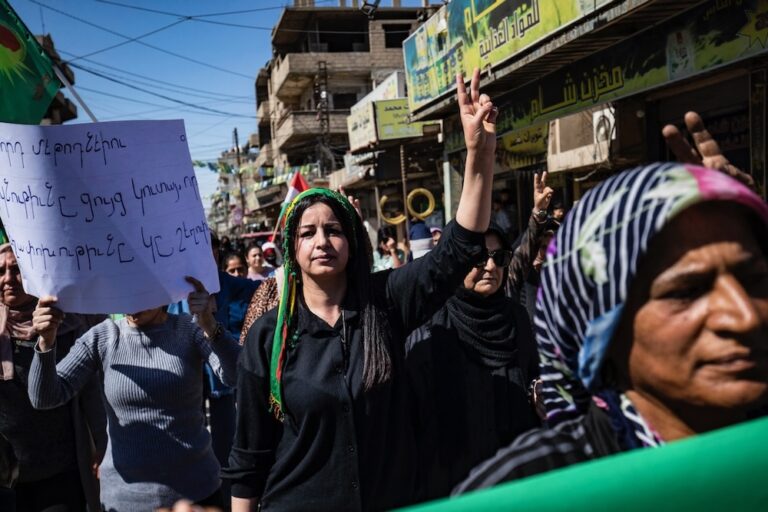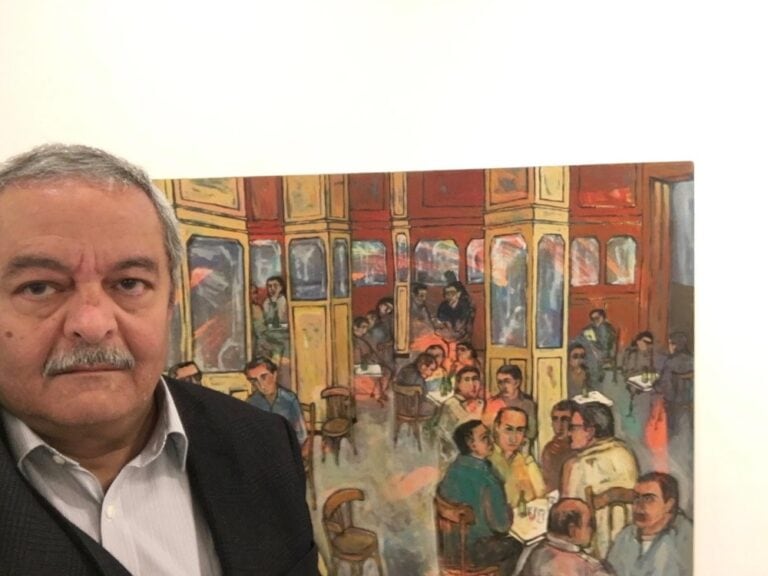(WPFC/IFEX) – The following is a statement by WPFC Executive Director Marilyn Greene on World Press Freedom Day: ‘Insult’ Laws: A Colonial Hangover Haunts Africa’s Press Statement by Marilyn Greene Executive Director World Press Freedom Committee Windhoek, Namibia May 3, 2001 Good afternoon, and thank you for standing by for this part of the program […]
(WPFC/IFEX) – The following is a statement by WPFC Executive Director Marilyn Greene on World Press Freedom Day:
‘Insult’ Laws: A Colonial Hangover Haunts Africa’s Press
Statement by Marilyn Greene
Executive Director
World Press Freedom Committee
Windhoek, Namibia
May 3, 2001
Good afternoon, and thank you for standing by for this part of the program after such a full and fulfilling day of events and ideas.
We are in Windhoek to commemorate the historic Declaration adopted here a decade ago, and to assess its subsequent impact on freedom of the press in Africa and around the world.
You are already familiar with the history of important regional meetings that followed Windhoek in Asia, Europe and the Middle East. These conferences and the declarations coming from them have built an ever-stronger foundation of support and affirmation for the principles of a universal right to freedom of expression and of the press. Together, they emphasize that this right belongs to all the people of the world, as provided in Article 19 of the Universal Declaration of Human Rights, the most clear, simple and true statement of our right to research and report the news. It says:
“Everyone has the right to freedom of opinion and expression; this right includes freedom to hold opinions without interference and to seek, receive and impart information and ideas through any media and regardless of frontiers.”
You know it well. Article 19 is the journalist’s creed.
Unfortunately, it is not considered so sacred by all, especially by those public officials who find journalists’ seeking and imparting of information annoying or threatening.
In defiance of their duty to serve and represent their constituents as public servants, these officials seek to conceal their actions from the people. Among the tools most widely used to this end are so-called “insult” laws, designed in another age to shield kings from dishonor. Today, inappropriately, officials in more than 100 nations continue to hide from scrutiny behind laws that make it a crime to criticize.
It is easy to see that such laws are inconsistent with Article 19. Indeed, international bodies including the European Court of Human Rights and the Inter-American Commission on Human Rights have declared them out of democratic order, and recommended their repeal.
But such laws are just too convenient for authoritarian leaders to surrender easily. Although they are rarely used in democratic countries, insult laws continue to exist there – and stand as negative role models for developing countries writing new laws and constitutions.
Nowhere is this unfortunate legacy more evident than in Africa, where at least 20 countries cling to insult laws modeled after those of the colonial powers that once reigned in the region. France might not employ its 1881 insult law often – the last time was in the 1960s, when someone in a crowd yelled something rude at President Charles de Gaulle. In 1974, when Valery Giscard d’Estaing took office, he vowed he would never use the 1881 law to protect himself. Likewise, President Francois Mitterrand made it a point to not resort to it. But neither president acted on calls to repeal the law. Anachronistic and undemocratic as it is, that 1881 law still stands in France.
How convenient, then, for former French colonies in Africa to replicate this old law, and invoke it when a leader feels the heat of a journalistic inquiry.
Cameroon is notorious for its French-style insult laws, which are invoked regularly to punish journalists and news media with jail sentences and crippling fines. Pius Njawe and many other brave Cameroon journalists know this system well and are familiar with such charges as “Contempt of the President,” use of an “insulting expression,” publishing “false news” and “tarnishing the image” of Cameroon.
In Cote d’Ivoire, “offending the President of the Republic” is a crime punishable by three months to two years imprisonment and/or a fine of up to 3 million francs, about $5,000. As recently as 1996, journalists of La Voie were jailed for satirical pieces deemed insulting to President Bedie.
As Ghanian lawyer Anthony Akoto Ampaw pointed out to a Council of Europe conference, “In Africa, you can be sure that there will be the worst interpretations of law, even if the worst interpretations are unlikely in Europe.”
Ghana’s President John Agyekum Kufuor pledged in February that his party would repeal the country’s criminal libel law, which was introduced by its former British colonial government. But no repeal action has occurred and in April, Ghana’s attorney general told parliament that the law will remain on the books to make sure that journalists discharge their duties “responsibly.” In defending this assertion, he noted that Britain also has such laws. The implication: ‘If it’s good for them, it’s good for us.’
Likewise, insulting the president, flag, parliament of foreign heads of state are criminal offenses in Botswana, Central African Republic, Republic of Congo, Ethiopia, Malawi, Niger, Nigeria, Senegal, Uganda, Zambia and Zimbabwe, as well as in Northern Africa’s Algeria, Morocco, Tunisia and Yemen. And as we meet here today, Eritrean lawmakers are considering a new press law that provides imprisonment for three months to five years for “whosoever insults, abuses, defames or slanders the Government or one of the constituted legislative, executive, or judicial authorities.” And it is three months in jail or a fine for anyone who “insults the Eritrean Flag.”
What can be done to persuade presidents and parliaments to abandon this kind of legalistic camouflage?
We know such change is possible. Kenya repealed its sedition provisions in 1997. South Africa once had a law protecting the president from being brought into disrepute. But it was dropped in the 1980s – demonstrating again that such laws are dispensable, if the will is there to eliminate them.
My organization, the World Press Freedom Committee, has been working to answer that question, and to see insult laws eliminated. We’ve published a book based on global research by a University of North Carolina media law professor, and this lays out the basic information – which countries have insult laws, which ones actually use them.
We are urging legislators, judges and leaders in countries with insult laws to repeal the laws and embrace an open and transparent system of government. We did this in Costa Rica, a country considered a leading democracy in the Americas, yet one which still has an insult or desacato law on its books. During our visit to Costa Rica in February, President Rodriguez promised WPFC Chairman James Ottaway that he would seek repeal of the desacato law and reform of other defamation statutes used to restrict the free flow of information there. His reform proposal is now before Costa Rica’s Legislative Assembly; its adoption would make Costa Rica a true leader in the development of democracy in Latin America.
It is important for journalists – publishers, editors, reporters and columnists – to keep leaders’ feet to the fire on this issue of accountability. Through news reporting and editorial columns, journalists can remind readers and leaders that the proper role for a nation’s executive, legislative and judicial officers is to serve the people they represent. Their actions must be more – not less – susceptible to public scrutiny than those of ordinary citizens.
The European Court of Human Rights has on numerous occasions expressed this view in turning aside legal efforts to punish “insult.” It said in a case involving Croatia’s irreverent Feral Tribune, “the very function of the press in a democratic society (is) to participate in the political process by checking on the development of the debate of public issues carried on by political office-holders.”
The idea that public officials deserve protection from public criticism is as out of date as the notion of the divine right of kings. Today is democracy’s day. Our public officials work for the public, and serve at the will of the people, as expressed in free elections. Press freedom cannot be said to exist in any nation where journalists are jailed. And without press freedom, no nation can call itself a democracy.
For officials who are disgruntled over press coverage, plenty of civil legal remedies already exist, in customary libel and slander legislation available to all citizens.
Simply put, insult laws must go. In a free and democratic society, the goal must be more discourse, not less. And popular or not, the journalist must be the eyes and ears of society, its watchdog in the halls of government.
When journalists and lawmakers in your country determine that they are ready to take this important step toward openness, your colleagues in the international free press community will mobilize to help. We can support you by publicly encouraging those who are resistant to change or who are fearful of transparency, and by reminding them that only through openness and transparency can a nation fulfill its economic, social and political potential.


